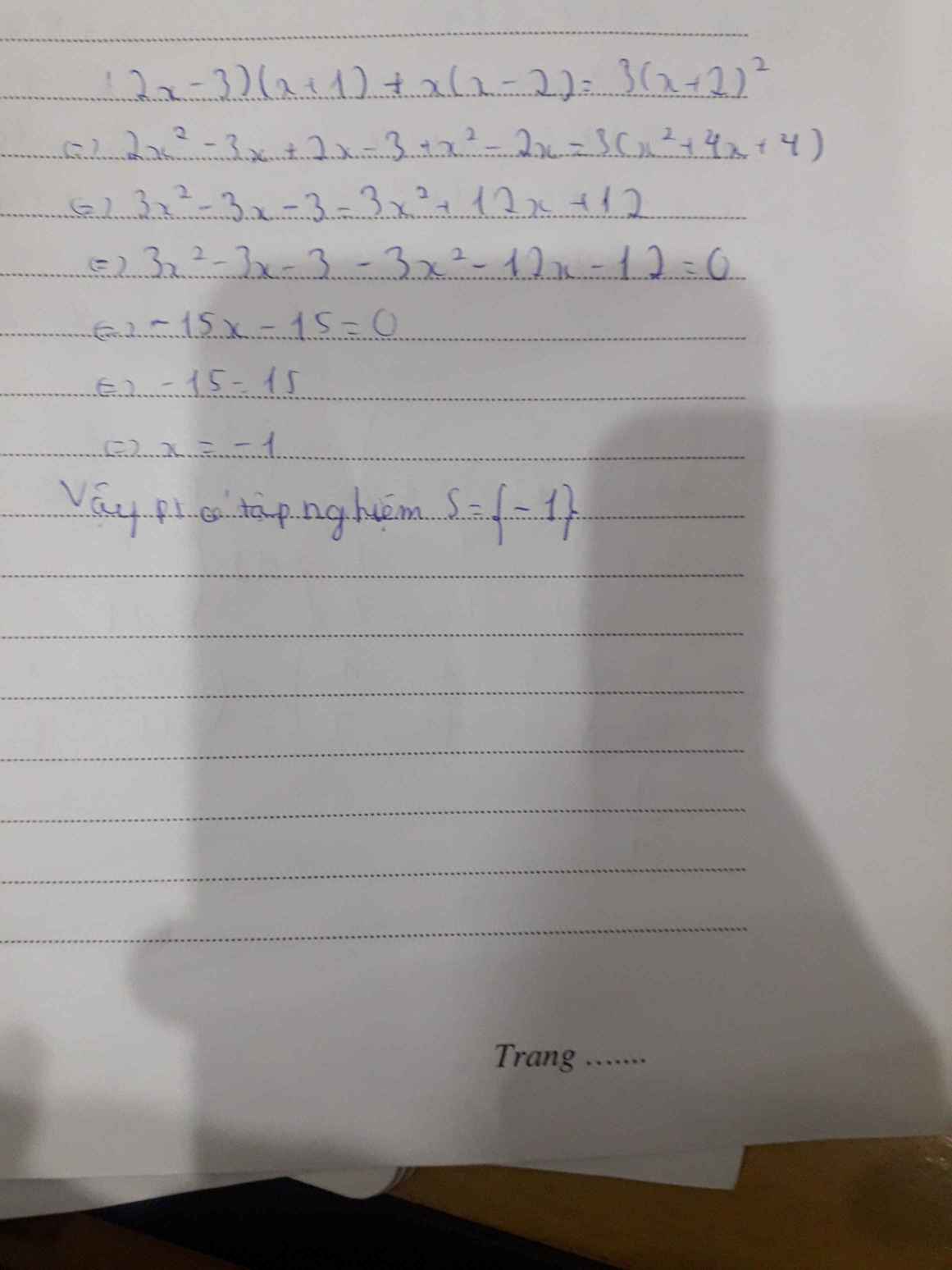

Hãy nhập câu hỏi của bạn vào đây, nếu là tài khoản VIP, bạn sẽ được ưu tiên trả lời.



Ta có: \(x^2\left(x^3-1\right)=0\)
\(\Leftrightarrow\left\{{}\begin{matrix}x^2=0\\x^3-1=0\end{matrix}\right.\)
\(\Leftrightarrow\left\{{}\begin{matrix}x=\sqrt{0}=0\\x=\sqrt[3]{1}=1\end{matrix}\right.\)
Vậy x=1 và x=1
Mình chỉ đưa hướng thôi, còn bạn tự giải nhé (mình để VP=0 do bạn không nói gì)
\(x^2\left(x^3-1\right)=0\left(1\right)\\ \Leftrightarrow x^2\left(x-1\right)\left(x^2+x+1\right)=0\left(1a\right)\)
Do \(x^2+x+1=\left(x+\dfrac{1}{2}\right)^2+\dfrac{3}{4}\ge0\left(\forall x\in R\right)\) nên... bạn tự suy ra tiếp nhé ![]()
Chúc bạn học tốt!

Bài 1:
a) 5(x-3)-4=2(x-1)
\(\Leftrightarrow5x-15-4=2x-2\)
\(\Leftrightarrow5x-19-2x+2=0\)
\(\Leftrightarrow3x-17=0\)
\(\Leftrightarrow3x=17\)
\(\Leftrightarrow x=\frac{17}{3}\)
Vậy: \(x=\frac{17}{3}\)
b) 5-(6-x)=4(3-2x)
\(\Leftrightarrow5-6+x=12-8x\)
\(\Leftrightarrow-1+x-12+8x=0\)
\(\Leftrightarrow-13+9x=0\)
\(\Leftrightarrow9x=13\)
\(\Leftrightarrow x=\frac{13}{9}\)
Vậy: \(x=\frac{13}{9}\)
c) (3x+5)(2x+1)=(6x-2)(x-3)
\(\Leftrightarrow6x^2+3x+10x+5=6x^2-18x-2x+6\)
\(\Leftrightarrow6x^2+13x+5=6x^2-20x+6\)
\(\Leftrightarrow6x^2+13x+5-6x^2+20x-6=0\)
\(\Leftrightarrow33x-1=0\)
\(\Leftrightarrow33x=1\)
\(\Leftrightarrow x=\frac{1}{33}\)
Vậy: \(x=\frac{1}{33}\)
d) \(\left(x+2\right)^2+2\left(x-4\right)=\left(x-4\right)\left(x-2\right)\)
\(\Leftrightarrow x^2+4x+4+2x-8=x^2-2x-4x+8\)
\(\Leftrightarrow x^2+6x-4=x^2-6x+8\)
\(\Leftrightarrow x^2+6x-4-x^2+6x-8=0\)
\(\Leftrightarrow12x-12=0\)
\(\Leftrightarrow x=1\)
Vậy:x=1
Bài 2:
a)\(\frac{x}{3}-\frac{5x}{6}-\frac{15x}{12}=\frac{x}{4}-5\)
\(\Leftrightarrow\frac{x}{3}-\frac{5x}{6}-\frac{5x}{4}-\frac{x}{4}+5=0\)
\(\Leftrightarrow\frac{4x}{12}-\frac{10x}{12}-\frac{15x}{12}-\frac{3x}{12}+\frac{60}{12}=0\)
\(\Leftrightarrow4x-10x-15x-3x+60=0\)
\(\Leftrightarrow-24x+60=0\)
\(\Leftrightarrow-24x=-60\)
\(\Leftrightarrow x=\frac{5}{2}\)
Vậy: \(x=\frac{5}{2}\)
b) \(\frac{8x-3}{4}-\frac{3x-2}{2}=\frac{2x-1}{2}+\frac{x+3}{4}\)
\(\Leftrightarrow\frac{8x-3}{4}-\frac{3x-2}{2}-\frac{2x-1}{2}-\frac{x+3}{4}=0\)
\(\Leftrightarrow\frac{8x-3}{4}-\frac{2\left(3x-2\right)}{4}-\frac{2\left(2x-1\right)}{4}-\frac{x+3}{4}=0\)
\(\Leftrightarrow8x-3-2\left(3x-2\right)-2\left(2x-1\right)-\left(x+3\right)=0\)
\(\Leftrightarrow8x-3-6x+4-4x+2-x-3=0\)
\(\Leftrightarrow-3x=0\)
\(\Leftrightarrow x=0\)
Vậy: x=0
c) \(\frac{x-1}{2}-\frac{x+1}{15}-\frac{2x-13}{6}=0\)
\(\Leftrightarrow\frac{15\left(x-1\right)}{30}-\frac{2\left(x+1\right)}{30}-\frac{5\left(2x-13\right)}{30}=0\)
\(\Leftrightarrow15\left(x-1\right)-2\left(x+1\right)-5\left(2x-13\right)=0\)
\(\Leftrightarrow15x-15-2x-2-10x+65=0\)
\(\Leftrightarrow3x+48=0\)
\(\Leftrightarrow3x=-48\)
\(\Leftrightarrow x=-16\)
Vậy: x=-16
d) \(\frac{3\left(3-x\right)}{8}+\frac{2\left(5-x\right)}{3}=\frac{1-x}{2}-2\)
\(\Leftrightarrow\frac{3\left(3-x\right)}{8}+\frac{2\left(5-x\right)}{3}-\frac{1-x}{2}+2=0\)
\(\Leftrightarrow\frac{9\left(3-x\right)}{24}+\frac{16\left(5-x\right)}{24}-\frac{12\left(1-x\right)}{24}+\frac{48}{24}=0\)
\(\Leftrightarrow9\left(3-x\right)+16\left(5-x\right)-12\left(1-x\right)+48=0\)
\(\Leftrightarrow27-9x+80-16x-12+12x+48=0\)
\(\Leftrightarrow-13x+143=0\)
\(\Leftrightarrow-13x=-143\)
\(\Leftrightarrow x=11\)
Vậy: x=11
e) \(\frac{3\left(5x-2\right)}{4}-2=\frac{7x}{3}-5\left(x-7\right)\)
\(\Leftrightarrow\frac{3\left(5x-2\right)}{4}-2-\frac{7x}{3}+5\left(x-7\right)=0\)
\(\Leftrightarrow\frac{9\left(5x-2\right)}{12}-\frac{24}{12}-\frac{28x}{12}+\frac{60\left(x-7\right)}{12}=0\)
\(\Leftrightarrow9\left(5x-2\right)-24-28x+60\left(x-7\right)=0\)
\(\Leftrightarrow45x-18-24-28x+60x-420=0\)
\(\Leftrightarrow77x-462=0\)
\(\Leftrightarrow77x=462\)
\(\Leftrightarrow x=6\)
Vậy:x=6
Bài 3:
a) \(\left(5x-4\right)\left(4x+6\right)=0\)
\(\Leftrightarrow\left(5x-4\right)\cdot2\cdot\left(2x+3\right)=0\)
Vì \(2\ne0\)
nên \(\left[{}\begin{matrix}5x-4=0\\2x+3=0\end{matrix}\right.\Leftrightarrow\left[{}\begin{matrix}5x=4\\2x=-3\end{matrix}\right.\Leftrightarrow\left[{}\begin{matrix}x=\frac{4}{5}\\x=\frac{-3}{2}\end{matrix}\right.\)
Vậy: \(x\in\left\{\frac{4}{5};-\frac{3}{2}\right\}\)
b) \(\left(x-5\right)\left(3-2x\right)\left(3x+4\right)=0\)
\(\Leftrightarrow\left[{}\begin{matrix}x-5=0\\3-2x=0\\3x+4=0\end{matrix}\right.\Leftrightarrow\left[{}\begin{matrix}x=5\\2x=3\\3x=-4\end{matrix}\right.\Leftrightarrow\left[{}\begin{matrix}x=5\\x=\frac{3}{2}\\x=\frac{-4}{3}\end{matrix}\right.\)
Vậy: \(x\in\left\{5;\frac{3}{2};\frac{-4}{3}\right\}\)
c) \(\left(2x+1\right)\left(x^2+2\right)=0\)
Ta có: \(\left(2x+1\right)\left(x^2+2\right)=0\)(1)
Ta có: \(x^2\ge0\forall x\)
\(\Rightarrow x^2+2\ge2\ne0\forall x\)(2)
Từ (1) và (2) suy ra:
\(2x+1=0\)
\(\Leftrightarrow2x=-1\)
\(\Leftrightarrow x=\frac{-1}{2}\)
Vậy: \(x=\frac{-1}{2}\)
d) \(\left(8x-4\right)\left(x^2+2x+2\right)=0\)
\(\Leftrightarrow4\left(2x-1\right)\left(x^2+2x+2\right)=0\)
Ta có: \(x^2+2x+2=x^2+2x+1+1=\left(x+1\right)^2+1\)
Ta lại có \(\left(x+1\right)^2\ge0\forall x\)
\(\Rightarrow\left(x+1\right)^2+1\ge1\ne0\forall x\)(3)
Ta có: \(4\ne0\)(4)
Từ (3) và (4) suy ra
2x-1=0
\(\Leftrightarrow2x=1\)
\(\Leftrightarrow x=\frac{1}{2}\)
Vậy: \(x=\frac{1}{2}\)
Bài 4:
a) \(\left(x-2\right)\left(2x+3\right)=\left(x-1\right)\left(x-2\right)\)
\(\Leftrightarrow2x^2+3x-4x-6=x^2-2x-x+2\)
\(\Leftrightarrow2x^2-x-6=x^2-3x+2\)
\(\Leftrightarrow2x^2-x-6-x^2+3x-2=0\)
\(\Leftrightarrow x^2+2x-8=0\)
\(\Leftrightarrow x^2+2x+1-9=0\)
\(\Leftrightarrow\left(x+1\right)^2-3^2=0\)
\(\Leftrightarrow\left(x+1-3\right)\left(x+1+3\right)=0\)
\(\Leftrightarrow\left(x-2\right)\left(x+4\right)=0\)
\(\Leftrightarrow\left[{}\begin{matrix}x-2=0\\x+4=0\end{matrix}\right.\Leftrightarrow\left[{}\begin{matrix}x=2\\x=-4\end{matrix}\right.\)
Vậy: \(x\in\left\{2;-4\right\}\)
b) \(\left(2x+5\right)\left(x-4\right)=\left(x-5\right)\left(4-x\right)\)
\(\Leftrightarrow\left(2x+5\right)\left(x-4\right)-\left(x-5\right)\left(4-x\right)=0\)
\(\Leftrightarrow\left(2x+5\right)\left(x-4\right)+\left(x-5\right)\left(x-4\right)=0\)
\(\Leftrightarrow\left(x-4\right)\left(2x+5+x-5\right)=0\)
\(\Leftrightarrow\left(x-4\right)\cdot3x=0\)
Vì \(3\ne0\)
nên \(\left[{}\begin{matrix}x=0\\x-4=0\end{matrix}\right.\Leftrightarrow\left[{}\begin{matrix}x=0\\x=4\end{matrix}\right.\)
Vậy: \(x\in\left\{0;4\right\}\)
c) \(9x^2-1=\left(3x+1\right)\left(2x-3\right)\)
\(\Leftrightarrow\left(3x-1\right)\left(3x+1\right)-\left(3x+1\right)\left(2x-3\right)=0\)
\(\Leftrightarrow\left(3x+1\right)\left[\left(3x-1\right)-\left(2x-3\right)\right]=0\)
\(\Leftrightarrow\left(3x+1\right)\left(3x-1-2x+3\right)=0\)
\(\Leftrightarrow\left(3x+1\right)\left(x+2\right)=0\)
\(\Leftrightarrow\left[{}\begin{matrix}3x+1=0\\x+2=0\end{matrix}\right.\Leftrightarrow\left[{}\begin{matrix}3x=-1\\x=-2\end{matrix}\right.\Leftrightarrow\left[{}\begin{matrix}x=\frac{-1}{3}\\x=-2\end{matrix}\right.\)
Vậy: \(x\in\left\{-\frac{1}{3};-2\right\}\)
d) \(\left(x+2\right)^2=9\left(x^2-4x+4\right)\)
\(\Leftrightarrow x^2+4x+4-9\left(x^2-4x+4\right)=0\)
\(\Leftrightarrow x^2+4x+4-9x^2+36x-36=0\)
\(\Leftrightarrow-8x^2+40x-32=0\)
\(\Leftrightarrow-\left(8x^2-40x+32\right)=0\)
\(\Leftrightarrow-8\left(x^2-5x+4\right)=0\)
Vì \(-8\ne0\)
nên \(x^2-5x+4=0\)
\(\Leftrightarrow x^2-x-4x+4=0\)
\(\Leftrightarrow x\left(x-1\right)-4\left(x-1\right)=0\)
\(\Leftrightarrow\left(x-1\right)\left(x-4\right)=0\)
\(\Leftrightarrow\left[{}\begin{matrix}x-1=0\\x-4=0\end{matrix}\right.\Leftrightarrow\left[{}\begin{matrix}x=1\\x=4\end{matrix}\right.\)
Vậy: \(x\in\left\{1;4\right\}\)
e) \(4\left(2x+7\right)^2-9\left(x+3\right)^2=0\)
\(\Leftrightarrow4\left(4x^2+28x+49\right)-9\left(x^2+6x+9\right)=0\)
\(\Leftrightarrow16x^2+112x+196-9x^2-54x-81=0\)
\(\Leftrightarrow7x^2+58x+115=0\)
\(\Leftrightarrow7x^2+23x+35x+115=0\)
\(\Leftrightarrow x\left(7x+23\right)+5\left(7x+23\right)=0\)
\(\Leftrightarrow\left(7x+23\right)\left(x+5\right)=0\)
\(\Leftrightarrow\left[{}\begin{matrix}7x+23=0\\x+5=0\end{matrix}\right.\Leftrightarrow\left[{}\begin{matrix}7x=-23\\x=-5\end{matrix}\right.\Leftrightarrow\left[{}\begin{matrix}x=\frac{-23}{7}\\x=-5\end{matrix}\right.\)
Vậy: \(x\in\left\{\frac{-23}{7};-5\right\}\)
Bài 5:
a) \(\left(9x^2-4\right)\left(x+1\right)=\left(3x+2\right)\left(x^2-1\right)\)
\(\Leftrightarrow\left(9x^2-4\right)\left(x+1\right)-\left(3x+2\right)\left(x^2-1\right)=0\)
\(\Leftrightarrow\left(3x-2\right)\left(3x+2\right)\left(x+1\right)-\left(3x+2\right)\left(x+1\right)\left(x-1\right)=0\)
\(\Leftrightarrow\left(3x+2\right)\left(x+1\right)\left[\left(3x-2\right)-\left(x-1\right)\right]=0\)
\(\Leftrightarrow\left(3x+2\right)\left(x+1\right)\left(3x-2-x+1\right)=0\)
\(\Leftrightarrow\left(3x+2\right)\left(x+1\right)\left(2x-1\right)=0\)
\(\Leftrightarrow\left[{}\begin{matrix}3x+2=0\\x+1=0\\2x-1=0\end{matrix}\right.\Leftrightarrow\left[{}\begin{matrix}3x=-2\\x=-1\\2x=1\end{matrix}\right.\Leftrightarrow\left[{}\begin{matrix}x=\frac{-2}{3}\\x=-1\\x=\frac{1}{2}\end{matrix}\right.\)
Vậy: \(x\in\left\{-\frac{2}{3};-1;\frac{1}{2}\right\}\)
b) \(\left(x-1\right)^2-1+x^2=\left(1-x\right)\left(x+3\right)\)
\(\Leftrightarrow x^2-2x+1-1+x^2=x+3-x^2-3x\)
\(\Leftrightarrow2x^2-2x=-x^2-2x+3\)
\(\Leftrightarrow2x^2-2x+x^2+2x-3=0\)
\(\Leftrightarrow3x^2-3=0\)
\(\Leftrightarrow3\left(x^2-1\right)=0\)
\(\Leftrightarrow3\left(x-1\right)\left(x+1\right)=0\)
Vì \(3\ne0\)
nên \(\left[{}\begin{matrix}x-1=0\\x+1=0\end{matrix}\right.\Leftrightarrow\left[{}\begin{matrix}x=1\\x=-1\end{matrix}\right.\)
Vậy: \(x\in\left\{1;-1\right\}\)
c) \(x^4+x^3+x+1=0\)
\(\Leftrightarrow x^3\left(x+1\right)+\left(x+1\right)=0\)
\(\Leftrightarrow\left(x+1\right)\left(x^3+1\right)=0\)
\(\Leftrightarrow\left(x+1\right)\left(x+1\right)\left(x^2-x+1\right)=0\)
\(\Leftrightarrow\left(x+1\right)^2\cdot\left(x^2-x+1\right)=0\)(5)
Ta có: \(x^2-x+1=x^2-2\cdot x\cdot\frac{1}{2}+\frac{1}{4}-\frac{1}{4}+1=\left(x-\frac{1}{2}\right)^2+\frac{3}{4}\)
Ta lại có: \(\left(x-\frac{1}{2}\right)^2\ge0\forall x\)
\(\Rightarrow\left(x-\frac{1}{2}\right)^2+\frac{3}{4}\ge\frac{3}{4}\ne0\forall x\)(6)
Từ (5) và (6) suy ra
\(\left(x+1\right)^2=0\)
\(\Leftrightarrow x+1=0\)
\(\Leftrightarrow x=-1\)
Vậy: x=-1

a. 5-(x-6)=4(3-2x)
<=>5-x+6 = 12-8x
<=>-x+8x =-5-6+12
<=>7x=1
<=>x=\(\frac{1}{7}\)
Vậy phương trình có nghiệm là S= ( \(\frac{1}{7}\))
c.7 -(2x+4) =-(x+4)
<=> 7-2x-4=-x-4
<=>-2x+x= -7+4-4
<=> -x = -7
<=> x=7
Vậy phương trình có nghiệm là S=(7)

1: \(\Leftrightarrow5x^2+4x-1-2x^2+12x-18=3x^2+5x-2-x^2-8x-16+x^2-x\)
\(\Leftrightarrow3x^2+16x-19=3x^2-4x-18\)
=>20x=1
hay x=1/20
2: \(\Leftrightarrow5x^2-20x-41=x^2-10x+25+4x^2+4x+1-\left(x^2-2x\right)+\left(x-1\right)^2\)
\(\Leftrightarrow5x^2-20x-41=4x^2-4x+26+x^2-2x+1\)
\(\Leftrightarrow-20x-41=-6x+27\)
=>-14x=68
hay x=-34/7


Mình giải từ cuối lên , mình giải dần -)
n, <=> x(2x-1)-3(2x-1)=0
<=> (x-3)(2x-1)=0
<=> x= 3 hoặc x= 1/2
m, <=> (x+2)(x2-3x+5)-x2(x+2)=0
<=> (x+2)(x2-3x+5-x2)=0
<=> (x+2)(5-3x)=0
=> x= -2 hoặc5/3

a) (x - 2)3 + (3x - 1)(3x + 1) = (x + 1)3
<=> x3 - 6x2 + 12x - 8 + 9x2 - 1 = x3 + 3x2 + 3x + 1
<=> x3 + 3x2 + 12x - x3 - 3x2 - 3x = 1 + 9
<=> 9x = 10
<=> x = 10/9
vậy S = {10/9}
b) (x - 1)3 - x(x + 1)2 = 5x(2 - x) - 11(x + 2)
<=> x3 - 3x2 + 3x - 1 - x3 - 2x2 - x = 10x - 5x2 - 11x - 22
<=> -5x2 + 2x - 10x + 5x2 + 11x = -22 + 1
<=> 3x = -21
<=> x = -7
Vậy S = {-7}
c) (x + 1)(2x - 3) = (2x - 1)(x + 5)
<=> 2x2 - x - 3 = 2x2 + 9x - 5
<=> 2x2 -x - 2x2 - 9x = -5 + 3
<=>-10x = -2
<=> x = 1/5 Vậy S = {1/5}
d) (x - 1) - (2x - 1) = 9 - x
<=> x - 1 - 2x + 1 = 9 - x
<=> -x + x = 9
<=> 0x = 9 (vô nghiệm)
=> pt vô nghiệm
e) (x - 3)(x + 4) - 2(3x - 2) = (x - 4)2
<=> x2 + x - 12 - 6x + 4 = x2 - 8x + 16
<=> x2 - 5x - x2 + 8x = 16 + 8
<=> 3x = 24
<=> x = 8
Vậy S = {8}
g) (x + 1)(x2 - x + 1) - 2x = x(x + 1)(x - 1)
<=> x3 + 1 - 2x = x3 - x
<=> x3 - 2x - x3 + x = -1
<=> -x = -1 <=> x = 1
Vậy S = {1}